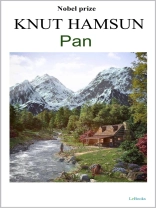Pan is an evocative exploration of isolation, nature, and the emotional turbulence of human desire. Knut Hamsun delves into the mind of Lieutenant Thomas Glahn, a solitary man living in the wilderness of northern Norway, who forms a complex and destructive attachment to Edvarda, a woman from a nearby village. Through Glahn's interactions with the natural world and his tumultuous relationship with Edvarda, Hamsun presents an introspective look at the thin line between passion and self-destruction.
Since its publication, Pan has been acclaimed for its raw portrayal of psychological conflict and the profound effects of solitude on the human spirit. Hamsun's vivid descriptions of the Scandinavian wilderness mirror Glahn's inner struggles, making nature both a refuge and a reflection of his mind. This unique narrative style, often associated with Hamsun's early works, has influenced existential and modernist literature deeply, leaving an enduring impact.
The novel remains relevant due to its introspective view on human nature and its exploration of the complexities of love and obsession. By delving into Glahn's psyche and his interactions with the natural world, Pan raises timeless questions about identity, the pursuit of happiness, and the often-destructive nature of unrestrained passion.
About the author
Knut Hamsun was a Norwegian author and Nobel laureate, celebrated as one of the most innovative and controversial figures in modern literature. Born in the rural town of Lom, Norway, Hamsun's work captures the complexities of human psychology and the tensions between individual desires and societal expectations. His novels often delve into themes of isolation, irrational impulses, and the connection between people and nature, influencing generations of writers and redefining the literary landscape.
Hamsun's influence on modern literature is profound. He inspired writers such as Franz Kafka, Thomas Mann, and Ernest Hemingway, who admired his unique portrayal of subjective experience and psychological depth. However, his reputation remains controversial due to his vocal support of Nazi Germany during World War II, which led to a decline in his standing post-war. Despite this, his contributions to literature continue to be acknowledged, and he is credited with pioneering narrative techniques that shaped 20th-century fiction.
Hamsun's characters often struggle against societal constraints, embodying the tension between civilization and primal nature. His narrative style, rich in introspection and ambiguity, resonates with existentialist and modernist themes, making his work a vital part of the literary canon despite the complexities surrounding his legacy.
Knut Hamsun passed away in 1952 at the age of 92. His literary achievements continue to captivate readers and scholars alike, though his political views cast a shadow on his legacy. Today, Hamsun's work is studied as both a remarkable contribution to modernist literature and a complex reflection of the turbulent social issues of his time. Despite the controversies, Hamsun's exploration of human emotions and instincts endures, offering a profound and unsettling vision of the human experience that remains relevant in contemporary literature.












